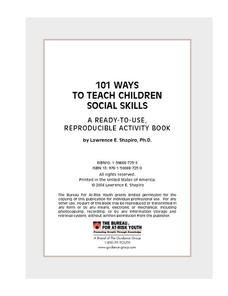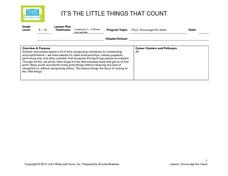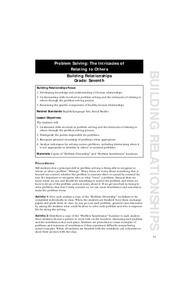Curated OER
Be Friendly at School
In this social studies worksheet, students learn that it is important to know how to be a friend. Students read the information on the page about friendship. Students write about why they think it is important to be friendly at school....
Reed Novel Studies
Runaway Ralph: Novel Study
Maybe the grass isn't always greener on the other side. Ralph, a mouse character in Runaway Ralph, thought that summer camp had to be better than dealing with his mother, uncle, and cousins. However, camp has its troubles, too. Worksheet...
Curated OER
Making Up
Is there a more important skill to learn at school then conflict resolution? It's never too soon to begin teaching youngsters how to work through the inevitable conflicts they will have during their school years. This resource combines...
Curated OER
Helping My Friends Stay on Track
Good friends help each other stay on track to meet their personal goals. HIgh schoolers discuss how they can be or use co-pilots (friends) to reach their career and education goals. Activities and several worksheets are included.
All for KIDZ
Giraffes Can’t Dance Concepts: Giraffes Can't Dance
Teach young children that with a little perseverance and the help of a good friend, anything is possible. This two-part lesson series based on the book Giraffe's Can't Dance starts with a shared reading about Gerald and his attempts to...
Guidance Group
101 Ways to Teach Children Social Skills
Increasing pressure to improve student achievement has made it easy to overlook the social skills they also need to develop. With this collection of worksheets and activities, you'll be able to improve children's communication, teamwork,...
John Wiley & Sons
It's the Little Things That Count
Encourage your young leaders to acknowledge small victories and the unique abilities and strengths of others. Class members are assigned to observe a classmate and note their talents and interests, concluding in an "awards ceremony"...
GeorgiaStandards.org
Family and Friends
Build your own Spanish unit about family and friends with these assessments and activities! Included here are several summative assessments to choose from and many activity ideas, cross-curricular tasks, and formative assessments you can...
Learning for Life
Building Relationships
Understanding how to relate to others and participate in healthy human relationships is an important life skill for young learners to develop. Learners will use the worksheets to discuss problem solving in human interactions, and how...
Learning for Life
Trust Me - I Won't Let You Down
What is fairness? What does it mean to be trustworthy? Learners explore these concepts in an important life skills instructional activity, which includes reading a story, responding to sample scenarios, and classroom discussion.
Social Skills Central
Photo Cartoons: Being Polite
Have you ever been left out of plans your friends were discussing? This photo cartoon will help your learners recognize that being polite can go beyond just saying please and thank you by making sure others feel included and welcomed.
Social Skills Central
Photo Cartoons: Peer Pressure
What's the best way to handle someone pressuring you to do something you don't want to do? Learners discuss two photo cartoons illustrating a suggested right and wrong way to respond to peer pressure.
Social Skills Central
What You Need To Know About Cliques and Peer Pressure
Looking for a quick informational handout to get the conversation going about social cliques and peer pressure? This may be the resource you're looking for! Similar to a brochure, this covers the issues surrounding peer pressure, how...
Museum of Disability
Don't Laugh at Me
You can prevent bullying in your classroom by addressing kindness, empathy, and acceptance with your littlest learners early on. After reading Don't Laugh at Me by Steve Seskin and Allen Shamblin, kids discuss the ways that words can...
Museum of Disability
Don't Call Me Special
Introduce young learners to the idea of disabilities and making friends with children who are different than they are. Using Don't Call Me Special - A First Look at Disability by Pat Thomas, learners are guided through the new vocabulary...
Museum of Disability
A Picture Book of Louis Braille
Teach kids about the beginnings of the Braille writing system with a lesson about Louis Braille. A series of discussion questions guide young readers though A Picture Book of Louis Braille by David A. Adler, and once they finish the...
Museum of Disability
Rolling Along
Kindness and empathy can be as important as reading comprehension skills, especially for younger learners. Reinforce both with a lesson based on Rolling Along: The Story of Taylor and His Wheelchair by Jamee Riggio Heelan. As...
Museum of Disability
Looking Out for Sarah
Perry the dog is Sarah's best friend and her guide to the visual world. Young readers learn about guide dogs and communication with Looking Out for Sarah by Glenna Lang, through a series of discussion questions and activities.
Museum of Disability
Taking Down Syndrome to School
Teach your class about the ways they can befriend and understand people who are different from them with a reading comprehension lesson. As youngsters read Taking Down Syndrome to School by Jenna Glatzer, they answer a series of...
Museum of Disability
Taking Visual Impairment to School
What is the world like when you can't see, or when your vision is impaired? Learn about how Lisa communicates with the world around her with Taking Visual Impairment to School by Rita Whitman Steingold. Learners answer discussion...
Museum of Disability
Stand in My Shoes
Stand in My Shoes, a story by Bob Sornson, is an effective way to teach young learners about empathy and making friends. Once pupils read through the story, they answer a series of discussion questions and complete reading activities...
Project B.A.S.I.C. Child Development Specialist and Child Care Consultation
Better Attitudes and Skills in Children
Little kids often have very big feelings, and need help expressing them. A set of social emotional lessons provide tangible ways for young elementary learners to visualize their emotions, focus on clear communication, and channel their...
Fox Valley Unitarian Universalist Congregation
Conflict Resolution
Many teenagers struggle with resolving conflicts with peers, friends, or family members. Here's a form that can guide them through the steps they need to take to identify the problem, their contribution to the problem, and their...
Cru High School
Games / Icebreakers
Twenty-three, fun-filled activities make up a list of icebreakers designed to familiarize class members with one another, and add a sense of community to the classroom.
Other popular searches
- Healthy Friendships
- Building Friendships
- Making Friendships
- Abstinence Friendships
- Healthful Friendships
- Jealousy and Friendships
- Friendships Skills
- Dating and Friendships
- Developing Friendships
- Safe and Healthy Friendships
- Repairing Broken Friendships
- Building Healthy Friendships

























